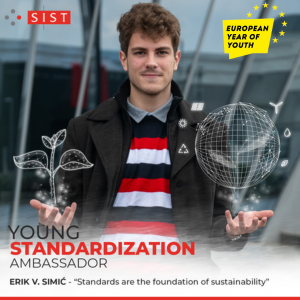The twin green and digital transitions open new opportunities for the European industry and citizens, in a quickly changing global scenario. But does Europe have what it takes? How can we make sure that it has the skills and the workforce to remain competitive in the global economy? And what is the role of standardization?
On the occasion of the European Year of Skills, which continues in 2024, we are relaunching our special campaign: through a series of interviews with standardization professionals, experts and business leaders coming from a variety of backgrounds, we will explore the interaction between innovation, skills and standardization in some of the most relevant sectors for Europe’s long-term competitiveness.
For the first episode in this year’s series of interviews, we interviewed Erik Vladimir Simić, a current engineering student and one of the Young Ambassadors for Standardization at SIST, the Slovenian Institute for Standardization, on the importance of involving young people in standardization and the unique skills and perspectives they offer.
1. Please, present yourself.
My name is Erik Vladimir Simić. I am a 19-year-old electrical engineering student, and I come from a town called Krško. I am in my first year of the Bun Electrical Engineering programme at the Faculty of Electrical Engineering at the University of Ljubljana. I graduated from a vocational school with a summa cum laude accolade and completed the SSI Electrotechnician programme with an emphasis on energetics. I have previously worked a summer job in my field of expertise in various well-known companies, such as Willy Stadler D. O. O. and HIS D. O. O.
2. Could you explain how you are involved in standardization, and what its value for your field of expertise is?
I was not directly involved in standardization until the beginning of the academic year, but through summer jobs and a compulsory internship that I did at a company as part of my high school education, I learned about standards-based workflows and standardized work, manufacturing, and working processes.
Having enrolled in the Young Ambassadors of Standardization programme, I have become more actively involved in standardization since the beginning of the current year. I was able to attend some committees that have created or implemented the technical standards in our (Slovenian) environment.
3. Why and how did you become interested in standardization?
My first encounter with standardization was in high school when some teachers mentioned standards in class. But being a young teenager at the time, I did not care about it much.
Over the years, however, I have developed an affinity for research, which in turn means that I am interested in any subject, no matter how difficult or extensive it may be. When I came to the faculty, as part of the Autumn School of Standardization, I was given the opportunity to learn more about the work of SIST and its importance. I became more and more interested in standardization work.
4. At SIST, you are part of the "Young Ambassador for Standardization" programme. Can you briefly explain what it is? What has been your experience?
The main goal of the Young Ambassador for Standardization programme is to bridge the gap between the Institute itself and the public, and more importantly, between the Institute and the younger generations – engineers-to-be. The ambassador programme helps to bring forth the Institute's work to young people, as they are not only the future of the Institute but also of engineering in general.
So far, my experience has been predominantly positive, interesting, and educational. The Institute's staff are very happy and enthusiastic to see that my co-ambassador and I are so eager to learn and ready to help in any way we can. I have already joined some of the technical committees and have thus also had the opportunity to witness the Institute's complex work first-hand.
5. 2024 continues as the European Year of Skills. What skills can young people learn from participating in standardization?
Standardization is essential for a wide range of economic sectors, as well as ones related to the quality of life. Young people can learn a great deal from participating in the standardization process.
They learn how to communicate better and work as a team, as standardization involves many experts from different fields to define state-of-the-art standards as best as they can. They acquire analytical skills such as critical thinking, thinking faster on their feet, and interpreting different information. They also learn how to resolve conflicts and lead a team.
These are just a few of the skills that young people develop by participating in the standardization process. In fact, there are many other skills that I have not mentioned. But all skills have one thing in common – the opportunity for paving a better road for one’s private and professional life.
6. Do you expect to be working with standards in the future? Do you think standards will give a boost to your future career?
Of course! No matter what industry I end up in after completing my studies, I expect to be working with at least some of the standards that are relevant to the field of my expertise.
I see the knowledge of standards, standardization, and their processes as an advantage on the job market, as it allows me to apply to a wider range of jobs (both in companies and in different industries – and not only in the field that I specialize in).
7. Why should there be more young people in standardization?
Young people should be involved in standardization as much as possible. Not only because the future of the world is in our hands, but also so that we can play a part in creating a better tomorrow for all kinds of industries, the economy, and society as a whole.
By being more active, younger generations can:
- Bring fresh and innovative ideas regarding different topics and problems.
- Ensure that standards remain relevant or even increase the impact that they have on our society.
- Add newer technical expertise to the standard creating process.
- Help create a more diverse community by establishing different age groups (collaboration of the young and old for the greater good).
8. What advice would you like to tell your fellow young professionals to invite them into the world of standardization?
I advise young professionals not to be afraid and to step out of their comfort zone by working in areas that they may not be experts in. I also recommend sometimes taking the road less travelled when making career choices. I suggest that they get as involved as possible in many different niche areas of engineering because in doing so, they can both widen their knowledge base and contribute to the betterment of society.
I would present them the importance of taking part in the standardization process because by doing so:
- You can learn new things and improve your skills.
- You meet many experts from different fields.
- You can get in contact with people within different industries, which helps with networking.
- You expand your knowledge of your own field as well as of many other fields that can benefit you in the future.
9. Do you think standardization has a role to play in addressing big challenges, such as the digital transition or climate change?
Standardization is a tool to improve the future. It is clear that it is going to play a crucial role in solving major problems such as the digital transition and climate change.
Through standardization, we can ensure that all countries are on the same page, making it easier to work together to solve both long-term and short-term problems.
This article is part of our special series dedicated to the European Year of Skills: through a series of articles and interviews with standardization professionals, experts and business leaders coming from a variety of background, we explore the interaction between innovation, skills and standardization in some of the most relevant sectors for Europe’s long-term competitiveness. You can read the other articles related to the campaign here.

Giovanni COLLOT
gcollot@cencenelec.eu



